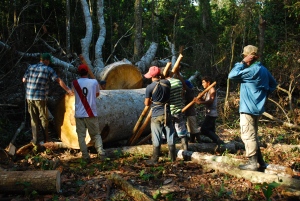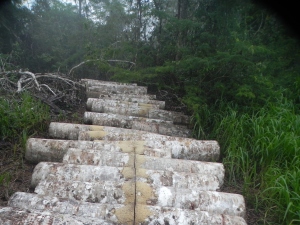How come nobody notice this before ?
Where are we going?Some of you will say “Oh boy, here comes that guy again.” I find it annoying too, to keep repeating myself, as though this were the only topic out there, or I didn’t know how to talk about anything else.
The truth is it’s that old question again: who came first, the chicken or the egg? It applies here in who’s responsible for the degradation of the Amazon, the tourist or the guide? I want to go out on a limb and say, “neither of them”.
The tourist does what he believes is right; at the end of the day what’s the harm in petting and cuddling a little monkey or a cute sloth? Apparently nothing.
And the guide who traps the animal for the tourist to hold? He just wants to please his clients and guarantee his pay.
So…what’s to be done? It’s a vicious circle and there’s nothing to be done until the people who are responsible for protecting the nature take a serious stance. As long as ruthless ambition fed by curruption continues to exist, there’s nothing to be done.
We have to call attention to this; the Peruvian Amazon is being attacked to an almost irreversible extent.
It’s unbelievable!
In order to create a source of income for the Amazon river-dwellers, ASSENTAMEINTOS, the government authorises each Peruvian citizen to cut down a certain number (80) trees each year from the Tapiche river area.
For this purpose they’ve created a “Primary Production Zone” (ZPP) that is meant to be a resource base (!?!?!?) for the river dwellers.
As though this were enough to free them of any obligation and responsibilty to fight for the natural environment and the native inhabitants of the Amazon, they transfer onto each family the responsibilty to procure food and shelter, without any form of public transportation or any equivalent services.
But this is merely the tip of the iceberg; what happens from that point forward is jaw-dropping.
In order to cut down his 80 annual trees, the river dweller doesn’t need any type of documentation, or any kind of responsible environmental impact or reforestation plan etc.
So the river dweller cuts the trees and sells his “product” in Requena (oh, how it hurts me to refer to the Amazon as a product) and with only his ID card the wood becomes legalised.
But hold on a moment… the reality is that the river dweller was contracted by the same person who contracts various other river dwellers to do the same. This “facilitator” is the one who gives him gasoline to travel out, a chainsaw, and bait (this one hurts me even more), salt, a fishing net and bullets. Thus the whole family is hired to cut trees, and at the end of the job all the supplies are discounted from their fee at a much higher price than the market rate, leaving the family who cut, and transported the trees, working for 3 or 4 months, nearly consistently in debt to the facilitator. He lives in a state of almost slave labour.
So, the facilitator “facilitates” a number of families using the same system and coordinates the timber to arrive all together, at the same time, in Requena.
The facilitator, in turn, works for a Timber King (?!?!?!) who has multiple facilitators spread throughout the Tapiche Basin.
This timber is all “legalised” in Requena using the ZPP law. Soon it is sold as “legally traded” wood in Iquitos to millionaire plywood manufacturers (triply).
Internationally known furniture manufacturers, like IKEA, thus source the majority of their raw materials from the Peruvian Amazon.
Thus the major timber companies avoid the responsibility to manage any kind of sustainability plan, or any social or environmental responsibility at all for that matter, and they get cheap labour, to boot. It’s impossible to avoid the thought that someone else besides the timber baron is making a lot of money in this scheme.
And that forces the question: Who created this Primary Production Zone? What is the true intention of such a scheme?
It’s painful to not be able to do anything in the face of such a catastrophic social and ecological disaster. Corruption and impunity generate millions of dollars for some very few Peruvians, while those who call the Amazon home are destroying it in order to simply survive.
(translation Portugues/English Elena Julia Greenlee, edit by David Crazyrainbow)









Resposta